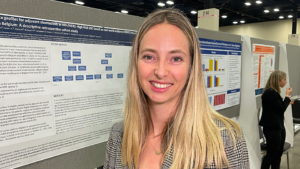In this poster from SABCS 2023, Kaat Van Herck, master student at the University Hospitals, Leuven, presented her master’s thesis on conventional imaging in early-stage invasive lobular breast cancer.
Invasive Lobular Breast Cancer (ILC), constituting 15% of all invasive breast cancers, is characterised by the loss or dysfunction of the adhesion molecule E-cadherin. This leads to a distinctive infiltrative growth pattern that tends not to disrupt normal breast tissue, making it challenging to detect with standard imaging techniques. Currently, mammography is believed to underestimate the extent of ILC, while MRI may overestimate it. Through the inclusion of numerous patients in our database, it was observed that all these imaging modalities underestimated the diameter of ILC.
Upon analysing the number of foci, it was found that MRI tended to overestimate the number, while ultrasound exhibited a low false-positive rate but a high false-negative rate. Consequently, it can be concluded that conventional imaging techniques underestimate the local extent of pathology in ILC. Addressing these limitations in imaging for ILC is of utmost importance, emphasising the need to prioritise the development of new imaging techniques to enhance diagnostic accuracy for these patients.
Reference:
Van Herck K. et al., Early stage invasive lobular breast cancer is underestimated on conventional imaging including MRI- SABCS 2023, # PO2-07-09


With the educational support of:
 |
 |
 |